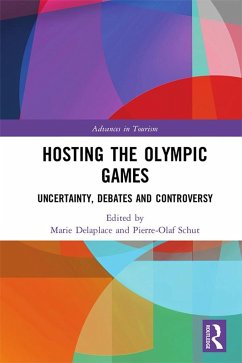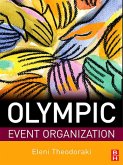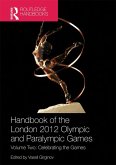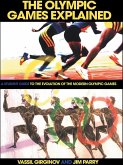Hosting the Olympic Games (eBook, ePUB)
Uncertainty, Debates and Controversy
Redaktion: Delaplace, Marie; Schut, Pierre-Olaf
42,95 €
42,95 €
inkl. MwSt.
Sofort per Download lieferbar

21 °P sammeln
42,95 €
Als Download kaufen

42,95 €
inkl. MwSt.
Sofort per Download lieferbar

21 °P sammeln
Jetzt verschenken
Alle Infos zum eBook verschenken
42,95 €
inkl. MwSt.
Sofort per Download lieferbar
Alle Infos zum eBook verschenken

21 °P sammeln
Hosting the Olympic Games (eBook, ePUB)
Uncertainty, Debates and Controversy
Redaktion: Delaplace, Marie; Schut, Pierre-Olaf
- Format: ePub
- Merkliste
- Auf die Merkliste
- Bewerten Bewerten
- Teilen
- Produkt teilen
- Produkterinnerung
- Produkterinnerung

Bitte loggen Sie sich zunächst in Ihr Kundenkonto ein oder registrieren Sie sich bei
bücher.de, um das eBook-Abo tolino select nutzen zu können.
Hier können Sie sich einloggen
Hier können Sie sich einloggen
Sie sind bereits eingeloggt. Klicken Sie auf 2. tolino select Abo, um fortzufahren.

Bitte loggen Sie sich zunächst in Ihr Kundenkonto ein oder registrieren Sie sich bei bücher.de, um das eBook-Abo tolino select nutzen zu können.
Hosting the Olympic Games: Uncertainty, Debates, and Controversy provides a broad and comprehensive analysis of past Olympic and Paralympic events shedding critical light on the future of the Games with a specific look at the upcoming Paris 2024 Olympics.
- Geräte: eReader
- ohne Kopierschutz
- eBook Hilfe
- Größe: 26.78MB
Andere Kunden interessierten sich auch für
![Hosting the Olympic Games (eBook, PDF) Hosting the Olympic Games (eBook, PDF)]() Hosting the Olympic Games (eBook, PDF)42,95 €
Hosting the Olympic Games (eBook, PDF)42,95 €![Olympic Event Organization (eBook, ePUB) Olympic Event Organization (eBook, ePUB)]() Eleni TheodorakiOlympic Event Organization (eBook, ePUB)57,95 €
Eleni TheodorakiOlympic Event Organization (eBook, ePUB)57,95 €![Handbook of the London 2012 Olympic and Paralympic Games (eBook, ePUB) Handbook of the London 2012 Olympic and Paralympic Games (eBook, ePUB)]() Handbook of the London 2012 Olympic and Paralympic Games (eBook, ePUB)63,95 €
Handbook of the London 2012 Olympic and Paralympic Games (eBook, ePUB)63,95 €![The Olympic Games Explained (eBook, ePUB) The Olympic Games Explained (eBook, ePUB)]() Jim ParryThe Olympic Games Explained (eBook, ePUB)57,95 €
Jim ParryThe Olympic Games Explained (eBook, ePUB)57,95 €![Olympic Marketing (eBook, ePUB) Olympic Marketing (eBook, ePUB)]() Alain FerrandOlympic Marketing (eBook, ePUB)47,95 €
Alain FerrandOlympic Marketing (eBook, ePUB)47,95 €![Japan Through the Lens of the Tokyo Olympics Open Access (eBook, ePUB) Japan Through the Lens of the Tokyo Olympics Open Access (eBook, ePUB)]() Japan Through the Lens of the Tokyo Olympics Open Access (eBook, ePUB)0,00 €
Japan Through the Lens of the Tokyo Olympics Open Access (eBook, ePUB)0,00 €![Action Sports and the Olympic Games (eBook, ePUB) Action Sports and the Olympic Games (eBook, ePUB)]() Belinda WheatonAction Sports and the Olympic Games (eBook, ePUB)34,95 €
Belinda WheatonAction Sports and the Olympic Games (eBook, ePUB)34,95 €-
-
-
Hosting the Olympic Games: Uncertainty, Debates, and Controversy provides a broad and comprehensive analysis of past Olympic and Paralympic events shedding critical light on the future of the Games with a specific look at the upcoming Paris 2024 Olympics.
Dieser Download kann aus rechtlichen Gründen nur mit Rechnungsadresse in A, B, BG, CY, CZ, D, DK, EW, E, FIN, F, GR, HR, H, IRL, I, LT, L, LR, M, NL, PL, P, R, S, SLO, SK ausgeliefert werden.
Produktdetails
- Produktdetails
- Verlag: Taylor & Francis eBooks
- Seitenzahl: 224
- Erscheinungstermin: 13. August 2019
- Englisch
- ISBN-13: 9781000546774
- Artikelnr.: 57471806
- Verlag: Taylor & Francis eBooks
- Seitenzahl: 224
- Erscheinungstermin: 13. August 2019
- Englisch
- ISBN-13: 9781000546774
- Artikelnr.: 57471806
- Herstellerkennzeichnung Die Herstellerinformationen sind derzeit nicht verfügbar.
Marie Delaplace (marie.delaplace@u-pem.fr) holds a PhD (1994) and a " habilitation à diriger les recherches" (2009) in economics on the emergence of different types of innovations (IT, biopolymers, transportation, services) in different places. Since 2011, she has been professor of planning and regional development in the Lab'Urba research unit at the "École d'urbanisme de Paris" (Paris School of Urban Planning) within Université Paris-Est Marne-la-Vallée (UPEM). Her works have focused on the wide-ranging effects of high-speed rail on local economic development for more than 15 years and on tourism and local economic development for more than 10 years. She is the co-director of the "City, Tourism, Transport and Territories" Group within the Urban Futures LabEx and represents the university president in the French association AsTRES (Association for Tourism Research and Higher Education). In 2017, she co-founded the Observatory for Research on Mega-Events (ORME) at Université Paris-Est (https://www.u-orme.fr/en/). Alone or with other researchers, she has published almost 60 articles in academic journals and 10 book chapters on these issues. Pierre-Olaf Schut (po.schut@u-pem.fr) is a Professor of sports history in the research center "Analyse Comparée des Pouvoirs" (EA 3350) at Université Paris-Est Marne-la-Vallée, France. His main research areas are the development of sports and their relationships with tourism and regional planning, especially regarding sports facilities. He also works on the history of Olympism and the legacy of mega-events. He has co-founded ORME, the Observatory for Research on Mega-Events. He is part of the editorial board of the International Journal of the History of Sport and elected in the International Society for the History of Physical Education and Sport council. He recently published in French Espaces et lieux de sport dans l'histoire by EPURE.
List of illustrations. List of contributors. Foreword: building the Olympic legacy for Paris 2024. Acknowledgements.
Introduction: Lessons from the past to understand the future of the Games.
Part I: Some debates concerning hosting Olympic Games
1. Why do cities withdraw from hosting the Olympic Games? 2. The battle for public opinion in host cities: The paradox of the Olympics as a troubled brand. 3. The International Olympic Committee's struggle against growing gigantism of the Olympic Games.
Part II: Olympic Games as a tool for urban and territorial development?
4. The territorial and urban dimensions of the Summer Olympics: A review of publications (1984-2018). 5. Bidding for the Olympic Games: A gearing effect? 6. The role of heritagization in managing uncertainties linked to major events and mega urban projects: Comparing the Olympic Games in London (2012) and Athens (2004). 7. The relationship between Olympic Games and tourism: Why such heterogeneity?: Towards a place-based approach.
Part III: Risk, uncertainty and environmental issues
8. Integrating public behaviours into operational responses to crisis situations: A way to improve security of major events? 9. The microbiological quality of the Seine River: Is it compatible with open water Olympic competitions? 10. Paris 2024 Olympic/Para-Olympic Games and air quality. Conclusion: Towards Olympic public-private partnerships.
Index.
Introduction: Lessons from the past to understand the future of the Games.
Part I: Some debates concerning hosting Olympic Games
1. Why do cities withdraw from hosting the Olympic Games? 2. The battle for public opinion in host cities: The paradox of the Olympics as a troubled brand. 3. The International Olympic Committee's struggle against growing gigantism of the Olympic Games.
Part II: Olympic Games as a tool for urban and territorial development?
4. The territorial and urban dimensions of the Summer Olympics: A review of publications (1984-2018). 5. Bidding for the Olympic Games: A gearing effect? 6. The role of heritagization in managing uncertainties linked to major events and mega urban projects: Comparing the Olympic Games in London (2012) and Athens (2004). 7. The relationship between Olympic Games and tourism: Why such heterogeneity?: Towards a place-based approach.
Part III: Risk, uncertainty and environmental issues
8. Integrating public behaviours into operational responses to crisis situations: A way to improve security of major events? 9. The microbiological quality of the Seine River: Is it compatible with open water Olympic competitions? 10. Paris 2024 Olympic/Para-Olympic Games and air quality. Conclusion: Towards Olympic public-private partnerships.
Index.
List of illustrations. List of contributors. Foreword: building the Olympic legacy for Paris 2024. Acknowledgements.
Introduction: Lessons from the past to understand the future of the Games.
Part I: Some debates concerning hosting Olympic Games
1. Why do cities withdraw from hosting the Olympic Games? 2. The battle for public opinion in host cities: The paradox of the Olympics as a troubled brand. 3. The International Olympic Committee's struggle against growing gigantism of the Olympic Games.
Part II: Olympic Games as a tool for urban and territorial development?
4. The territorial and urban dimensions of the Summer Olympics: A review of publications (1984-2018). 5. Bidding for the Olympic Games: A gearing effect? 6. The role of heritagization in managing uncertainties linked to major events and mega urban projects: Comparing the Olympic Games in London (2012) and Athens (2004). 7. The relationship between Olympic Games and tourism: Why such heterogeneity?: Towards a place-based approach.
Part III: Risk, uncertainty and environmental issues
8. Integrating public behaviours into operational responses to crisis situations: A way to improve security of major events? 9. The microbiological quality of the Seine River: Is it compatible with open water Olympic competitions? 10. Paris 2024 Olympic/Para-Olympic Games and air quality. Conclusion: Towards Olympic public-private partnerships.
Index.
Introduction: Lessons from the past to understand the future of the Games.
Part I: Some debates concerning hosting Olympic Games
1. Why do cities withdraw from hosting the Olympic Games? 2. The battle for public opinion in host cities: The paradox of the Olympics as a troubled brand. 3. The International Olympic Committee's struggle against growing gigantism of the Olympic Games.
Part II: Olympic Games as a tool for urban and territorial development?
4. The territorial and urban dimensions of the Summer Olympics: A review of publications (1984-2018). 5. Bidding for the Olympic Games: A gearing effect? 6. The role of heritagization in managing uncertainties linked to major events and mega urban projects: Comparing the Olympic Games in London (2012) and Athens (2004). 7. The relationship between Olympic Games and tourism: Why such heterogeneity?: Towards a place-based approach.
Part III: Risk, uncertainty and environmental issues
8. Integrating public behaviours into operational responses to crisis situations: A way to improve security of major events? 9. The microbiological quality of the Seine River: Is it compatible with open water Olympic competitions? 10. Paris 2024 Olympic/Para-Olympic Games and air quality. Conclusion: Towards Olympic public-private partnerships.
Index.







